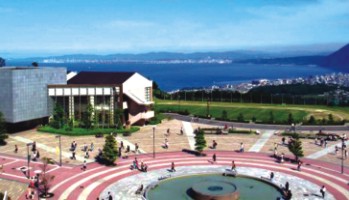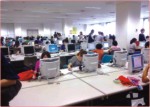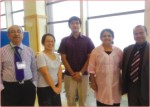Going Global
A Visit to APU
G.M. Nizam Uddin
Ivisited the APU premises on the 3rd day of my visit. APU is situated on top of the mountain more than 1000m above sea-level. From the APU premises, you can see that the whole city lies at the coast of the sea.
 All the delegates from China, Korea, Thailand, Hawaii, Sri Lanka and Bangladesh assembled together in the Conference Room. After introducing ourselves to each other, we met with the President of APU, Prof. Korenaga Shun in his office. Prof. Korenaga told us that the students of Bangladesh are doing very well at APU and he is looking forward to receiving more students from our country. He spoke of the vision of the APU, which is multiculturalism and internationalism. He had informed us that they have faculties from the East as well as the West and the western management concepts are taught with Japanese fundamentals. To me, APU represents the latest species of University education for the more globalised world. We agree that we need to know different cultures from around the world to respect and be respected by one another. APU's philosophy is to identify, distinguish and observe the culture of each group of students coming from different countries. There is a “Cultural Week” for the students of each country, e.g. Bangladesh Cultural Week, Thai Cultural Week, etc. during which the students are engaged in different kinds of cultural activities from their respective countries. We have learnt from the President that APU currently has students from 99 countries. Out of 6000 students, 50% are international students. Among the international students, Bangladesh is in 5th position with 73 students so far. There are 2 schools in APU- Asia Pacific Management (APM) and Asia Pacific Studies (APS). The basic areas studied in the College of Asia Pacific Studies are International Relations, International Sociology and Regional Studies. These studies are complemented by research in the four major fields relating to international society: Comparative Societies and Cultures, International Governance, Environmental Resource Policy, and Sustainable Development Studies. Study in all areas may involve fieldwork, joint research and internships. In their 1st and 2nd year, students will take foundation courses and concentrate on improving their Japanese language skills. After building up a solid knowledge base in the field of international relations, students may choose to study the other major field areas in more detail in their 3rd and 4th year. One of the highlights of the APU education system is its flexibility - students are not limited to just one major field, but may combine their studies to meet individual needs and interests. Students may even choose to take up to eight subjects from the College of Asia Pacific Management, further broadening their future employment prospects. All the delegates from China, Korea, Thailand, Hawaii, Sri Lanka and Bangladesh assembled together in the Conference Room. After introducing ourselves to each other, we met with the President of APU, Prof. Korenaga Shun in his office. Prof. Korenaga told us that the students of Bangladesh are doing very well at APU and he is looking forward to receiving more students from our country. He spoke of the vision of the APU, which is multiculturalism and internationalism. He had informed us that they have faculties from the East as well as the West and the western management concepts are taught with Japanese fundamentals. To me, APU represents the latest species of University education for the more globalised world. We agree that we need to know different cultures from around the world to respect and be respected by one another. APU's philosophy is to identify, distinguish and observe the culture of each group of students coming from different countries. There is a “Cultural Week” for the students of each country, e.g. Bangladesh Cultural Week, Thai Cultural Week, etc. during which the students are engaged in different kinds of cultural activities from their respective countries. We have learnt from the President that APU currently has students from 99 countries. Out of 6000 students, 50% are international students. Among the international students, Bangladesh is in 5th position with 73 students so far. There are 2 schools in APU- Asia Pacific Management (APM) and Asia Pacific Studies (APS). The basic areas studied in the College of Asia Pacific Studies are International Relations, International Sociology and Regional Studies. These studies are complemented by research in the four major fields relating to international society: Comparative Societies and Cultures, International Governance, Environmental Resource Policy, and Sustainable Development Studies. Study in all areas may involve fieldwork, joint research and internships. In their 1st and 2nd year, students will take foundation courses and concentrate on improving their Japanese language skills. After building up a solid knowledge base in the field of international relations, students may choose to study the other major field areas in more detail in their 3rd and 4th year. One of the highlights of the APU education system is its flexibility - students are not limited to just one major field, but may combine their studies to meet individual needs and interests. Students may even choose to take up to eight subjects from the College of Asia Pacific Management, further broadening their future employment prospects.
The core field of study offered by APM is International Management. Economic globalisation and technological innovation, particularly in the IT sector, are giving rise to fundamental changes in the nature of corporate management. The study of international management involves perceiving and developing solutions to such change. Once students grasp the basics of international management theory, students go on to learn about management in more detail in the four areas of specialization; Marketing and Corporate Strategy, Accounting and Finance, International Business and Comparative Management, and New Business and Innovation.
We have requested the President of APU to open a school for Science. He mentioned that they are considering opening a school for ICT and later on Science, based on the availability of international faculty members. When I spoke to Enam Iftekhar, a Bangladeshi student studying 3rd year BBA in APU and he said that if any student wants to work in an international organization or in any foreign country, they should come to APU because you will not find another place in the world where so many cultures and ideas co-exist. “I know how to work in a team and respect people's cultures and feelings. People can have different views and mindsets over the same issue but still work together for the same purpose”. To me, this seemed to be a very important skill to be acquired by young people in Bangladesh, as many Bangladeshis work in different countries after their studies.
In an information session Prof. Susumu Yamamoto, the Dean of Admissions at APU said, 'Today, we have to learn how to adapt to an unpredictable tomorrow. The APU students should learn to identify new problems and find solutions and alternatives.' He spoke of developing a global culture and bringing together all the citizens of the world to work for a united world. We saw a PowerPoint Presentation on how students of different cultural backgrounds learn together in his seminars. He has students of 14 different nationalities in his seminar class. Students can choose to study the same course in Japanese or English medium. Every course is taught in both languages at the same time. Also, students are offered different language courses such as Chinese, Korean, Thai, Indonesian, Japanese, English etc.
We were taken on a tour of the Library, Media Center, classrooms and student dormitories. Fatemi, a student from Bangladesh, mentioned that APU Library has a self-access integrated automatic system that allows the student to issue or return the book by himself, even if there is no library staff member present.
 We were taken to the Career Centre of APU where on-campus recruitment is conducted by different corporations and companies. Almost 98% of the students have acquired jobs by their 3rd year of undergraduate study. There are APU staff to help the students prepare resumes and to prepare for job interviews. We met a few students in a Bangladesh Information Session. Enam Iftekhar, currently studying his BBA, has already acquired a job in the biggest furniture company in Japan, where he will look after Asia Operations. Inui has shown us that 100% Bangladeshi students acquire jobs in Japan after their graduation from APU. Another student said that although he finished his diploma from a different University in Japan, his employer sent him to APU for further studies in BBA. Fateni is studying in his 2nd year, and working as a Resident Assistant (RA) in the APU Houses (students' dormitories) which are completely managed by the students. Fatemi has been working as an RA for a year and next year, he will live downtown in his own accommodation because he has secured a job. Students from Bangladesh mentioned that it takes 6 months for a Bangladeshi student to learn the Japanese language and to get a job. A student can work 28 hours in a week which is enough to cover costs and expenses. We were taken to the Career Centre of APU where on-campus recruitment is conducted by different corporations and companies. Almost 98% of the students have acquired jobs by their 3rd year of undergraduate study. There are APU staff to help the students prepare resumes and to prepare for job interviews. We met a few students in a Bangladesh Information Session. Enam Iftekhar, currently studying his BBA, has already acquired a job in the biggest furniture company in Japan, where he will look after Asia Operations. Inui has shown us that 100% Bangladeshi students acquire jobs in Japan after their graduation from APU. Another student said that although he finished his diploma from a different University in Japan, his employer sent him to APU for further studies in BBA. Fateni is studying in his 2nd year, and working as a Resident Assistant (RA) in the APU Houses (students' dormitories) which are completely managed by the students. Fatemi has been working as an RA for a year and next year, he will live downtown in his own accommodation because he has secured a job. Students from Bangladesh mentioned that it takes 6 months for a Bangladeshi student to learn the Japanese language and to get a job. A student can work 28 hours in a week which is enough to cover costs and expenses.
Inui explained that it is not difficult for Bangladeshi students to obtain a Japanese visa if the student has acceptance from APU. The University applies for a Certificate of Confirmation from immigration. Once the certificate is received, the student can apply for the Japanese visa. So far, no student with a Confirmation Certificate has been refused the Japanese visa.
 Inui and David said that Bangladesh is a country of preference for APU because the students are learning the Japanese language very quickly. Their spoken English is also very good. They study well and have a record of 100% job placement after graduation. So it seems that this is an opportunity for the Bangladeshi students to be incorporated into Japanese companies and economy. The advantage of APU is that students are not placed only in Japan, but all around the world in different Japanese companies and corporations. So if you can study with a scholarship or study and work at the same time to maintain your expenses, chances are that you will secure a job before graduation. This is an opportunity which should be explored by every eligible student in Bangladesh. Inui and David said that Bangladesh is a country of preference for APU because the students are learning the Japanese language very quickly. Their spoken English is also very good. They study well and have a record of 100% job placement after graduation. So it seems that this is an opportunity for the Bangladeshi students to be incorporated into Japanese companies and economy. The advantage of APU is that students are not placed only in Japan, but all around the world in different Japanese companies and corporations. So if you can study with a scholarship or study and work at the same time to maintain your expenses, chances are that you will secure a job before graduation. This is an opportunity which should be explored by every eligible student in Bangladesh.
The Vice-President of APU, who is a Professor of International Relations from US, appreciated the Bangladeshi students very much to me, saying “We are keeping our eyes on Bangladesh. So far, we have not heard of any extreme political, racial turmoil or terrorism threat for few years. We are seriously thinking about this country. ”
(The writer is the Principal, Oxford International School)
|
